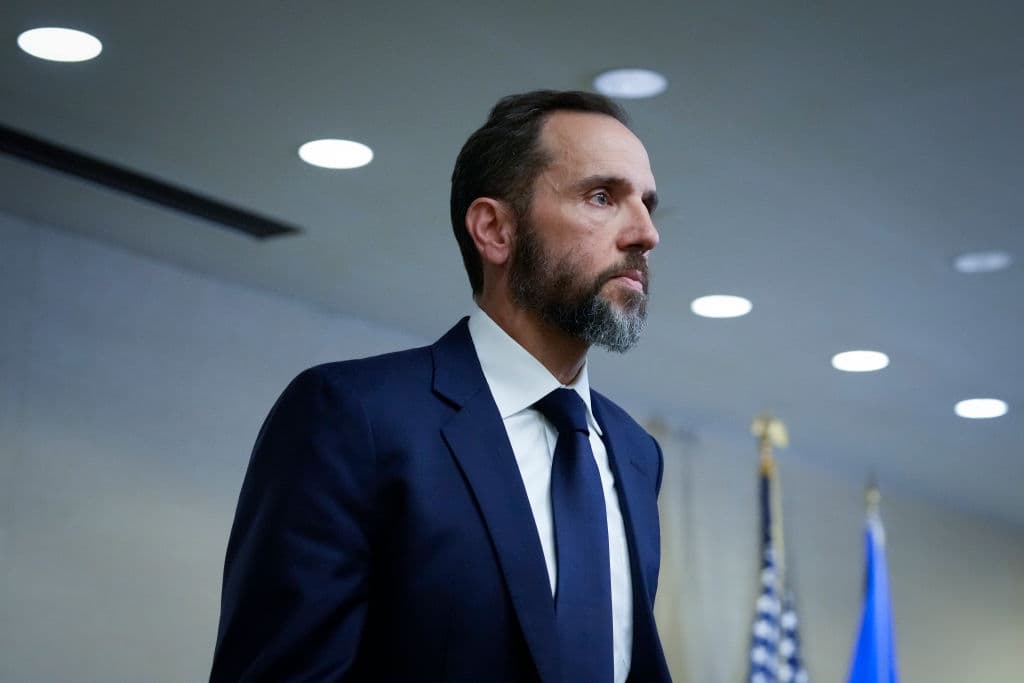Jack Smith Resigns, Having Failed To Take Trump to Trial for Either January 6 or the Secret Documents at Mar-a-Lago
The special counsel has ‘separated’ from the Department of Justice after his quest for convictions was thwarted by immunity he claimed didn’t exist.

The resignation of Special Counsel Jack Smith from the Department of Justice marks the end of the prosecutor’s efforts to convict President-elect Trump across two criminal cases.
Notification that Mr. Smith has departed the DOJ came in a Saturday filing to Judge Aileen Cannon urging her not to extend a temporary injunction. That order bars his final report on the classified documents and election interference cases from being published outside the justice department.
A footnote on the final page of the 11-page filing informs Judge Cannon that “the Special Counsel completed his work and submitted his final confidential report on January 7, 2025, and separated from the Department on January 10.” That final dossier now rests with Attorney General Garland.
The attorney general has announced his intention, per the special counsel regulations under which Mr. Smith operated, to release the volume on election interference post haste. The attorney general aims to release the volume on the storage of classified documents only to congressional leaders to review in camera. That is because the case against two of Trump’s co-defendants in South Florida, Waltine Nauta and Carlos De Oliveira, is still ongoing.
Mr. Smith’s resignation comes a little more than a year after Mr. Garland appointed him as special counsel on November 18, 2023. That was just two days after Trump declared his intention to retake the White House. While Mr. Smith had in the past led the DOJ’s public corruption unit, he was at the time of his hiring not a government employee but, instead, was prosecuting war crimes at the Hague.
Mr. Garland, in appointing Mr. Smith, said in a statement that it was “in the public interest to appoint a special counsel” because of “recent developments” that included Trump’s “announcement that he is a candidate for President in the next election.” President Biden was reportedly incensed that Mr. Garland only appointed a special counsel late in the 46th president’s term.
That Mr. Smith was never confirmed by the Senate would prove to matter enormously. That became apparent when Judge Cannon ruled that his appointment was unlaw, lacking, as it did, without the ballast of a legislative imprimatur or a relevant enabling statute. She dismissed the charges against Trump and Messrs. Nauta and De Oliveira. Mr. Smith appealed that ruling, but Trump’s victory in November short circuited that review.
Mr. Smith’s other prosecution of the 47th president, for election interference at the District of Columbia, was equally as ill-starred. The case appeared to be prospering when Judge Tanya Chutkan and then the District of Columbia Appeals Circuit both agreed that former presidents are not entitled to immunity. Judge Chutkan wrote that the 45th president did not, after leaving office, possess the “divine right of kings to evade the criminal accountability that governs his fellow citizens.”
The Supreme Court, though, in a landmark ruling authored by Chief Justice Roberts, dissented. Trump v. United States held that presidents are presumptively immune for their official actions and lack any immunity for their unofficial ones. Mr. Smith did not see this holding as fatal for his case — within a matter of weeks he secured a superseding indictment that alleged the same four crimes as the original one.
Mr. Smith also, with Judge Chutkan’s permission, crafted a case for why Trump could be tried notwithstanding immunity. He sketched that theory in a filing of more than 200 pages, quadruple the usual length allotted to such documents. Trump called that filing a “monstrosity” and a “political hit job.” The president-elect has often directed wrathful rhetoric at the special counsel, frequently calling him “deranged.”
President-electTrump’s victory at the ballot box, though, spelled the end of Mr. Smith’s quest. The Department of Justice ruled, for the third time in the last half-century, that there is a “categorical” prohibition on prosecuting sitting presidents.
While Mr. Smith maintained that his confidence in the “merits” of his case has never wavered, “circumstances” — the choice of the American people — meant that the special counsel would never have his day in court.

